1. Introduction
This case involves an appeal to the Supreme Court of Sri Lanka by the Attorney General challenging the acquittal of Hemasiri Fernando, the former Secretary of the Ministry of Defence, who faced multiple charges related to the tragic Easter Sunday bombings of April 21, 2019. These bombings, carried out by suicide attackers, resulted in the deaths of 268 individuals and injuries to over 500 others at various churches and hotels across Sri Lanka.
2. Key Facts of the Case
- Accused: Hemasiri Fernando, former Secretary to the Ministry of Defence, was indicted on 855 counts, including charges related to murder (Section 296) and attempted murder (Section 300) of the Penal Code, in connection with the bombings.
- Prosecution’s Allegations: The Attorney General alleged that the accused, through omissions in his official capacity, failed to act on intelligence warnings about imminent terrorist attacks, thereby abetting the crimes. The case against him was built on specific pieces of intelligence received prior to the attacks.
- Charges: The indictment included 268 counts of murder and 587 counts of attempted murder. The prosecution argued that the accused’s failure to act on intelligence reports contributed to the attacks.
- Intelligence Warnings: Key evidence included multiple intelligence reports sent to the accused by various agencies, warning of potential attacks, including specific threats to churches and hotels.
3. Proceedings in the High Court
- High Court-at-Bar Decision: The trial at the High Court-at-Bar concluded with the court acquitting Hemasiri Fernando on February 18, 2022, without calling for his defense. The High Court determined that the prosecution failed to establish a prima facie case to warrant proceeding to the defense stage.
- Prosecution’s Argument: The Attorney General, dissatisfied with the acquittal, argued that the High Court erred by not allowing the case to proceed to the defense stage. The prosecution contended that the evidence presented, particularly intelligence warnings, was sufficient to call upon the accused to present a defense.
4. Issues on Appeal to the Supreme Court
The Supreme Court was called upon to consider whether the High Court erred in its application of Section 200(1) of the Code of Criminal Procedure Act, which allows a trial judge to acquit an accused if, after the prosecution’s case, there is insufficient evidence to proceed.
The main legal questions addressed were:
- Whether the High Court Judges misapplied the law by prematurely acquitting the accused.
- Whether the evidence presented by the prosecution was sufficient to establish a prima facie case requiring the accused to be called for a defense.
- Whether the High Court’s focus on requiring “strong and penetrating evidence” was appropriate given the nature of the charges.
5. Supreme Court’s Analysis and Findings
- The Supreme Court, led by Justice P. Padman Surasena, found that the High Court’s decision to acquit the accused was based on a misinterpretation of the law, specifically Section 200(1) of the Code of Criminal Procedure.
- Key Misinterpretation: The High Court Judges incorrectly introduced the requirements of Section 107 of the Penal Code (concerning abetment by presence) into the analysis, even though the prosecution had not charged the accused under that section.
- Failure to Call for Defense: The Supreme Court emphasized that the High Court should have called for the defense, particularly given the gravity of the charges and the presence of intelligence reports indicating the accused’s knowledge of impending attacks.
- Importance of Mens Rea: The Court highlighted that the accused’s intention and state of mind (mens rea) were crucial aspects that could only be properly assessed after the defense had been heard. The Court criticized the High Court for not allowing the accused to explain his actions or inactions in response to the intelligence reports.
6. Decision
The Supreme Court set aside the High Court’s acquittal, ruling that there were sufficient grounds to proceed with the trial. The Court directed that the High Court-at-Bar continue the trial and call upon the accused to present his defense. This decision emphasizes the need for a full hearing, particularly in complex cases involving allegations of official negligence leading to mass casualties.
7. Conclusion
This case underscores the delicate balance between judicial discretion and the need for thorough legal proceedings, especially in cases involving serious national security implications. The Supreme Court’s decision reflects the principle that defendants in positions of significant responsibility, especially in matters of national security, must be held accountable if there is evidence suggesting a failure to act on critical intelligence. By allowing the case to proceed, the Supreme Court ensured that all relevant evidence and explanations would be thoroughly examined before a final verdict is reached.
8. Implications
- For the Legal System: The judgment highlights the importance of correctly applying procedural laws, particularly concerning the right to call for a defense in criminal trials.
- For Government Officials: The case sets a precedent that high-ranking officials can be held accountable for their inactions, especially when they have access to critical intelligence that could prevent harm to citizens.
- For Future Cases: The decision reinforces that judgments of acquittal should not be made prematurely, especially in cases involving complex issues of national security and public safety.
Read Judgement














